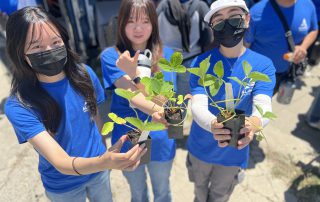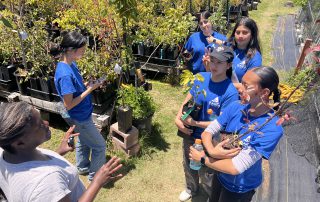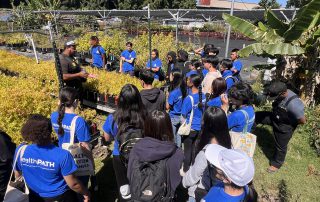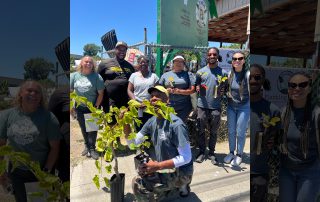On a beautiful sunny day in June, 46 high school HealthPATH students got out of the classroom and into the garden at Planting Justice, a food justice organization in Oakland that is tackling inequalities in access to fresh produce in low-income neighborhoods.
Students worked alongside the Planting Justice staff on the nursery’s two-acre grounds in the Sobrante Park neighborhood filled with hundreds of plants, and rows of fruit trees including apple, fig, European pear, Japanese plum, and more.
They got their hands dirty tending to hundreds of edible vegetable and herb gardens and learned about organic urban farming, how to grow their own food, and the importance of local food systems in promoting food security and building healthier communities.
Approximately 12.5% of Alameda County’s population or 200,000 people do not have enough food according to Feeding America, a nationwide network of food banks, and the average cost of a meal is almost 25% higher in the County than the national average.
As a result, food insecurity and the lack of access to affordable nutritious food can put residents at an increased risk for multiple chronic health conditions such as diabetes, obesity and heart disease.
Planting Justice is working to close the food insecurity gap and has installed 550 edible gardens at schools, community centers and homes, hosts education programs for local youth, distributes produce to local residents, gives away free fruit smoothies at Bay Area Rapid Transit (BART) stations, and sources produce for the Good Table, a nearby cafe where diners pay what they can afford.
Planting Justice also uses its nursery as a tool for social change to end the cycle of incarceration that continues to impact primarily people of color. The nursery has created jobs for 15 formerly incarcerated staff who came through their holistic re-entry program providing living wages, health benefits, peer support and a culture of wellness to help people stay out of prison.
They have employed more than 40 people transitioning from prison so far and since opening in 2009, the organization has only seen a 2% recidivism rate, compared to 50% statewide.
In addition, Planting Justice has created paid opportunities for over 100 youth interns who live in the neighborhood. Through their education program, Planting Justice hosts 2,500 youth each year where they get to experience a community-led, land-based social enterprise that supports the health and well-being of their own community.
The HealthPATH interns shared a variety of positive impressions from their field trip to Planting Justice and participation in their student program:
- “It was great to see the connection between food and health. At the hospital we are learning how to help patients get well and at Planting Justice we got to see how good, locally grown food can help them stay well.” – Angela
- “Planting Justice is awesome and I was really impressed by the work they do to help people in the community find jobs and reduce recidivism.” – Devon G.
- “I live nearby, and I never knew there was a community garden like Planting Justice so close. I’m glad I can help out and I hope to come back.” – Brenda Victoriano
For more information on volunteering, educational workshops and youth internships visit Planting Justice.









